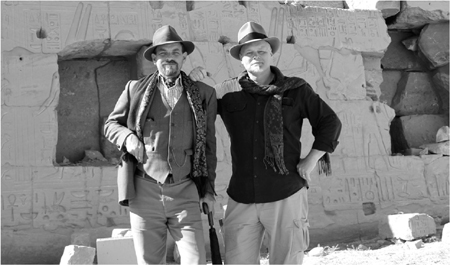

The authors, John Ward and Scotty Roberts, at Karnak Temple in Luxor, Egypt.
We end with a short myth pertaining to Hapu that was said to Manetho, the Greek educated Egyptian. The story tells of how Pharaoh Amenhotep III approached Hapu about how he could converse with the gods face to face as his ancestors had. Hapu went away to ponder and discuss the various options (no doubt with the gods themselves). It is said that he wrote a letter to the Pharaoh stating that, if he cleared the unclean—the shepherds and the lepers from the land of Egypt—then he would be able to converse with the gods face to face. Upon receiving Hapu’s letter, Pharaoh removed all the shepherds and lepers to the quarries of Egypt. But he was unsuccessful in his desire to converse face-to-face with the gods. There was a second part to the letter that Hapu did not send with the original that pertained to the consequences of such actions, saying that the expelled victims of Pharaoh’s obsession to communicate with the gods, who totaled 80,000 plus, would align themselves with the enemies of Egypt, and eventually invade and subdue Egypt for a total of 15 years. Unable to bear the guilt of not sending the second part through fear of upsetting his beloved Pharaoh, Hapu committed suicide. Josephus the Hebraic historian dismissed this story as pure myth and its plausible connection with the Hebrew Exodus.
If you thirst for knowledge, if you want to know the answers, if you are tired of relying simply on what you have been told, then go to the headwaters, dip your face in the pool, and drink deep. The answers are there; you simply have to go there and look for them. You may not always find the answers you want, and you will have challenges before, during, and after. But continue to ask, seek, and dig for the facts that may lead you to the truth of a matter.
As for Moses, you have been presented two equally illustrative pictures of who we think the man might have been. We are not satisfied simply casting him off as a cultural legend that has been turned to a religious myth. We know the man exists, and yet we have drawn different conclusions based on our different paths and directions of study.
But which one of us is right? Make no mistake; it truly doesn’t matter, even though we have threatened to settle the argument between us with an arm-wrestling contest. We seek because we want to know, and why would we want to know something that is inherently wrong? So, yes, there is not only time, but heart, tears, intellect, and relentless digging to try to find the answers. We sometimes even hope there’s some truth to be stumbled upon along the way.
Was Moses a man named Senenmut who was found by the Daughter of the Pharaoh? Was he a High Priest who served his Lord and Master and answered the call of the gods—or the god? Were the Hebrews a downtrodden people held in bondage, or were they an integrated people trying to find their moorings in an ancient world?
If you dig long enough and deep enough you will eventually find what you are looking for. It may not be the entire picture, but due to the never-ending search, you make it fit the scenario. Exodus is such a scenario; it has captivated and intrigued thousands of scholars for more than 2,000 years, and we’re pretty confident that it will continue to do so for a long time yet.